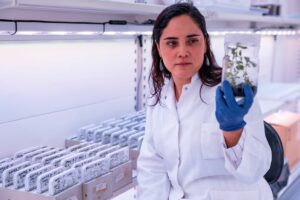Marcela fertilises the soil with a unique business idea
March 5, 2024
BY Nina Lyhne

Marcela Mendoza-Suárez, an entrepreneurial researcher, hopes that her biofertiliser will help create the future of sustainable agriculture. As a postdoc at Aarhus University, she has transformed her research from a budding idea into a promising startup.
It was an idea born in the barren desert of her native northern Mexico. Today, ten years later, from her laboratory at Aarhus University, Marcela Mendoza-Suárez is on the verge of a sustainable agricultural revolution. With her startup, SymbioMatch, the researcher creates tailored biofertilisers for agriculture to boost yields and profits in high-protein crops like fava beans and soybeans.
SymbioMatch identifies the optimal bacteria for a specific crop in a specific type of soil, regardless of location or weather conditions. As a result, the company can achieve the ideal balance of bacteria
in the individual farmer’s soil without using foreign chemistry or genetic modification.
“With our solution, we can create a transition from artificial fertilisers to biofertilisers, from animal protein to vegetable protein – and make the farmers themselves an active part of the green transition,” says Marcela Mendoza-Suárez.
A clear vision
Marcela Mendoza-Suárez’ path has been neither short nor straight, leading among other things to a PhD in molecular biology from Oxford University and then to a research project focused on specifically the fava bean at Aarhus University, where she is now a postdoc and assistant professor at the Department of Molecular Biology and Genetics. Here, she met Professor Stig Uggerhøj Andersen and Assistant Professor Marcin Nadzieja, who are now partners in SymbioMatch.
“I had a clear vision. I knew I needed a PhD to create my biofertiliser, and I knew I wanted to turn my research into real value for farmers, which required experience with entrepreneurship and innovation,” says Marcela Mendoza-Suárez.
Along the way, she discovered that The Kitchen offered professional assistance in creating commercial solutions based on her scientific discoveries.
Mentorship was essential
Marcela Mendoza-Suárez’ business venture was greatly impacted by the university’s startup hub, which provided her with the necessary skills to effectively communicate and pitch her ideas outside of academia.
“My invention is complex, and I needed to learn to use the right words so that I didn’t lose the entire audience at once. I can’t tell people I use green fluorescent protein, but I can tell them I find the right bacteria to improve crop efficiency,” says Marcela Mendoza-Suárez.
At The Kitchen, she was paired with a professional business developer through a mentorship, which helped her navigate the business aspects of her startup.
Field trials are the ultimate test
SymbioMatch is currently conducting field trials with crops in Germany to test the tailored biofertiliser, with additional trials planned for dry Southern Spain and wet Denmark.
“We’ve documented our solution in various crops and greenhouses, and we’re almost ready to provide farmers with an actual solution. The field trials are the ultimate test for our product, just as clinical trials in humans are for medicinal products,” says Marcela Mendoza-Suárez.
The solution is thus close at hand, but it could equally well have remained on paper in the laboratory. The research hit a stumbling block when Marcela Mendoza-Suárez realised she needed a bioreactor, which can convert raw materials into biochemical products, and they don’t exactly grow on trees.
Lending out a bioreactor
After several attempts to gain access to one, she was given the opportunity to use AU Engineering’s bioreactors, which resulted in the creation of the first prototypes of the customised fertilisers. She then obtained her own bioreactor through an AU Launch grant, which is intended for maturing entrepreneurial companies from Aarhus University.
“It was crucial because many similar entrepreneurial grants do not allow for the purchase of equipment. Precisely for this reason, the bioreactor must of course be accessible to other researchers and students with entrepreneurial ideas,” says Marcela Mendoza-Suárez.
In addition to providing access to the bioreactor, Marcela Mendoza-Suárez currently assists other researchers in scaling up their laboratory experiments. Among other things, she organises a workshop in which she and the reactor manufacturer teach postdocs and PhD students how to use bioreactors.
In her conversations with other aspiring entrepreneurs, Marcela Mendoza-Suárez also has good advice for getting off the ground with good ideas.
“We researchers want to create something that will solve a problem. So, instead of just thinking about how to solve the problem, consider how to make it a reality. That doesn’t mean you can’t still conduct research.”



